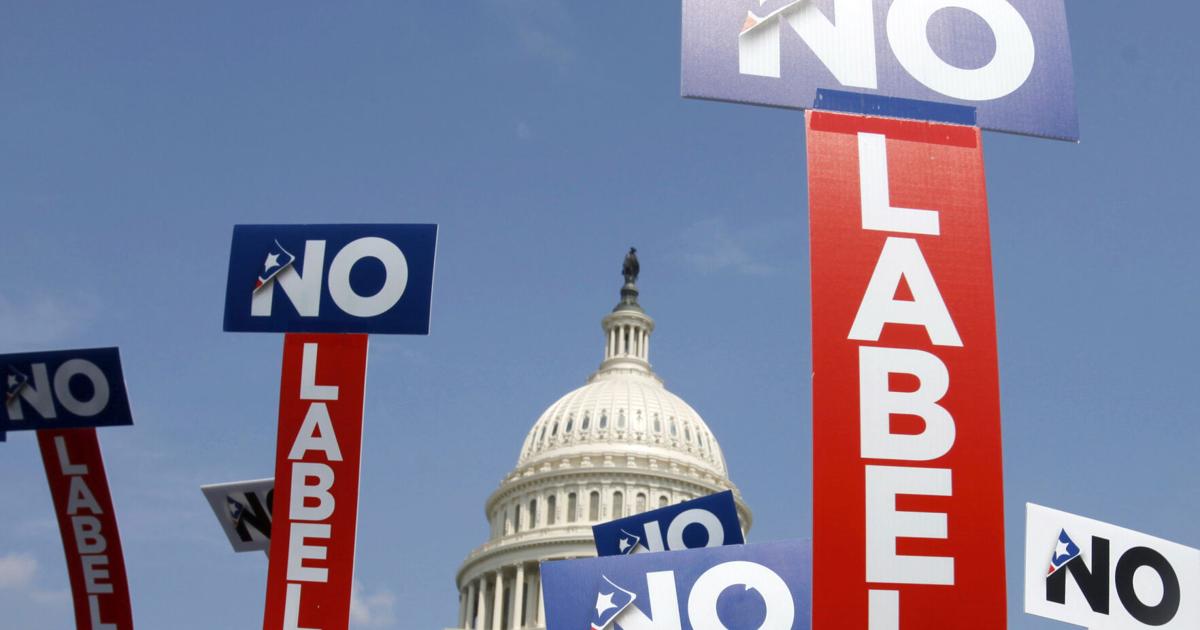
It is a collision of two requirements.
On the one hand, public revulsion is palpable at the prospect, if not the likelihood, of another presidential contest between Biden, the dinosaur, and Trump, the predator. This eventuality has about as much appeal as a root canal, minus the novocaine.
On the other hand, for much of the country, the idea of another four-year Trump occupation of the Oval Office, this time even more fueled by rage and retribution, and with the few adults of moderating influence long kicked out, is unfathomable.
This is where the No Labels effort to present a viable, centrist third-party alternative comes into the equation.
For an upstart operation predicated on the destruction of political labels, No Labels has become the target of many derisory labels from establishment actors, especially those with a Democratic attitude.
Insults happen daily. No Labels has been accused of naivety and being Trump’s hobbyhorse. Just this week, a Washington Post writer ridiculed the whole idea of “common sense.”
Here, 16 months before the election and a year before the Republicans gather in Milwaukee and the Democrats in Chicago for their nominating conventions, there is No Labels-induced panic in the air.
Even Third Way, a left-leaning think tank that one imagines might lend itself to a “third way,” openly acknowledges its intent to delegitimize No Labels before it takes off.
The numbers don’t lie. Nearly 70% of voters, including a majority of his own Democrats, would prefer Joe Biden to call him good and step down after one term. His popularity languished in the 1940s, dangerous territory for any incumbent.
Donald Trump, however, is hardly a colossus in the polls. Time and time again it exerts its magnetism on its unshakable base. But the reality — not Kellyanne Conway’s “alternative facts” — is that Biden beat him hands down in 2020. Moreover, the Trump-led GOP was crushed in 2018 and performed poorly in 2022. Losing has become his specialty, no matter the denials.
The first polls before 2024 are disappointing for Trump. As he overtakes his GOP competitors, he struggles to keep pace with an aging and slowing Biden. Trump’s main challenge, beyond staying out of jail, is attracting new voters. Anecdotally, I have yet to meet a single person who didn’t support Trump in 2020 but is eager to do so now.
No Labels reads the moment and sees the potential for a broad swath of the American electorate to reject the tired and the stale, portraying Biden and Trump and their two polarizing parties, in favor of something fresh, different and unifying.
Democratic strategists are reading these same indicators and recognizing that their surest path is to make it a bleak but ultimately one-sided choice between their shaky, boring candidate and the impeached, indicted, and damaging menace on the other side.
Biden is doing little to generate confidence, but Democrats feel pretty confident he can beat Trump one-on-one again. They have little interest in introducing a joker or seeing what is behind door number 3.
In a way, this premature upheaval about No Labels is another Trump function. In his absence, but public opinion being what it is in relation to politics at large, a moderate, less partisan third way could rally the country. But, for many, the Trump threat overwhelms everything and makes the risk too high.
With much fanfare last week, No Labels released a sweeping statement of principles. Of course, it lacked details. But it’s starting to have the makings of a platform. Before others get too bothered by generalities, let’s recall that a platform is something Republicans in 2020 have decided to give up entirely.
The No Labels principles include an “all of the above” approach to energy production; full access to abortion during the first months or pregnancy, but some restrictions during the following months; price transparency on hospital bills; and a bipartisan deficit reduction commission tasked with developing a plan that Congress would have to vote for or against without amendment.
There is more than a small resonance to such ideas. I would also suggest more than a little responsibility.
The leaders of No Labels promise that this will not be a futile or sacrificial effort, and that they will only move forward next year if there is a clearly viable path to success.
Maybe we should take them at their word until proven otherwise. Ultimately, that viability will hinge on No Labels picking a presidential ticket and attracting top bipartisan talent.
Serious names circulate. Among them are Joe Manchin, Jon Huntsman, Larry Hogan, Joe Lieberman, Susan Collins, Liz Cheney, even Mitt Romney and Chris Sununu. The fact that most of them are solid Republicans and a commitment to governance might ease some of the Democrats’ exaggerated angst.
Manchin has, in effect, become a bogeyman to many true left-wingers. Though they might consider there was another word applied to all those West Virginia voters who keep sending Manchin to Washington. This description of the past years is that of the Democrats. He is clearly addressing a constituency that the Democratic Party once represented, but has long forgotten.
The road is still long and windy until the 2024 election. Who even knows if Biden and Trump will be there at the end of this journey?
What if we woke up to a very diverse contest between Kamala Harris and Tim Scott? Or a face-to-face between Gavin Newsom and Glenn Youngkin, a couple of governors struggling to hide their ambition?
Certainly, the history of third-party candidacies makes them fade. But history is made by those who reject the idea that “it can’t be done”. Across the political landscape, there is a huge conflagration for 2024 to take a different course. The disgust with the process and both parties is boundless. The fastest growing share of voters is that of voters not affiliated with either party. To accompany the large number of those who are unhappy with the two presumed candidates.
For now, sage advice urges us to take a collective breath and see what might unfold. Third parties are spoilers until they become trend setters and story makers.
Eric Sondermann is a freelance political commentator based in Colorado. He writes regularly for Colorado Politics and The Gazette newspapers. Join it at(email protected); follow him on @EricSondermann



